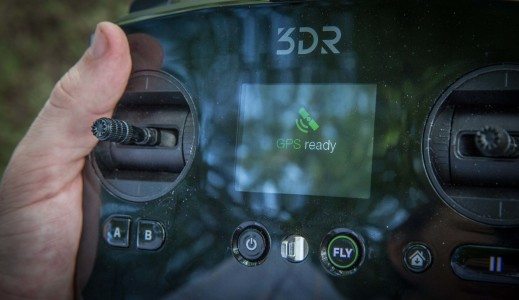I have long been a fan of 3DR and the Iris+. The Solo came on strong but due to technical issues many early buyers were left standing at the altar, so to speak, waiting for the gimbal that would complete the package.
Well it has arrived and now 3DR has released a vital upgrade that will get your gimbal working with your Solo. Now we can see the Solo in it’s true form. I am anxiously awaiting my unit so that I can put it through a rigorous field test.
Here is the release from 3DR.
This week we’ve rolled out some important updates that will go a long way toward making your Solo experience even more smooth and easy. This includes updates for both Solo and the Solo app—remember, the Solo app will do all of the update work wirelessly, without any need to connect to Solo with cables. For a walk-through of that workflow, see the bottom of this post.
Here’s a quick summary of what the new updates include and what that means to you.
Solo 1.05
This is an update for Solo’s on-board software, basically an update for the copter itself. Mostly this round involves tuning and improving Solo’s GPS functionality. With these updates, Solo has better GPS acquisition, which means good things for your in-flight experience. Here’s what we’ve done.
 Solo will now fly better in environments where GPS signal may be less accessible or more sensitive, such as areas with peripheral objects like buildings and trees that can interfere with reception. But even with this improvement you’ll want to be mindful when you choose where to fly. Please stick to wide open places without nearby trees or structures that could occlude or interfere with the satellite signals Solo relies on for its GPS lock. This is especially important for new users who might not yet be comfortable flying in FLY:Manual mode.
Solo will now fly better in environments where GPS signal may be less accessible or more sensitive, such as areas with peripheral objects like buildings and trees that can interfere with reception. But even with this improvement you’ll want to be mindful when you choose where to fly. Please stick to wide open places without nearby trees or structures that could occlude or interfere with the satellite signals Solo relies on for its GPS lock. This is especially important for new users who might not yet be comfortable flying in FLY:Manual mode.
Speaking of which, Solo now detects when GPS starts to decay and automatically switches you into FLY:Manual mode when the signal drops below a certain threshold. (In FLY:Manual, Solo automatically holds its altitude for you, but you’re responsible for controlling its position in space; it’s like Solo’s on a skating rink in the air.) The Solo controller will vibrate and let you know when you have good GPS again, and will automatically put you back into regular FLY mode. If you’re flying for a while without GPS, Solo won’t automatically switch you back into FLY; however, the controller will vibrate and let you know the option is again available.
These updates also improve Solo’s GPS checks. Solo measures GPS quality and ensures the lock is strong and steady before takeoff. If it doesn’t have a good signal, the controller will say “Searching for GPS”; if you really want to fly, you can flip into FLY:Manual, but be aware that Solo’s home location will be set in the first spot where it gets a good GPS lock.
And remember: When GPS is lost, neither “pause” nor “return home” functions are available because they’re position-based. For this reason, we strongly urge all users to spend time in an open space getting comfortable with FLY:Manual*. This way, if you fly into an environment with poor GPS reception, you’ll still feel comfortable controlling Solo.
Lastly, if Solo’s in Land mode—such as if battery is running low or you’ve hit RTL—you can reverse its descent just by increasing the throttle. This means that if you want to break control of an auto-land or a fail-safe, you have the option to—but be careful and always pay attention to what Solo tells you, because you might be in a failsafe mode and not know it.
iOS update 1.01
We’ve also made a couple of important updates to the iOS app. Perhaps most importantly, the live video feed sometimes wouldn’t work for some users; but now it will.
Also, we’ve fixed the bugs responsible for app crashes. Do remember, though, that there’s nothing wrong with the copter if the app crashes—Solo will just pause in place and hover while you restart the app.
Android 1.0.1
We’ve updated Android to accommodate Samsung Tablet S and S Pro.
Here’s the workflow for executing the new update:



